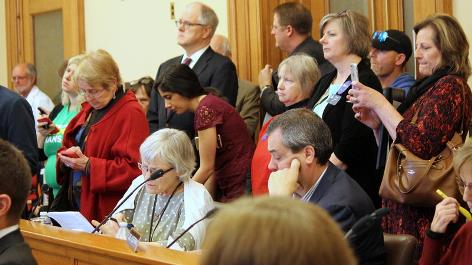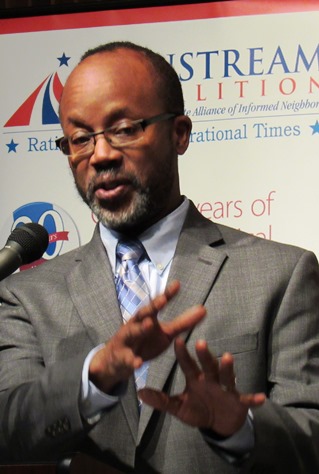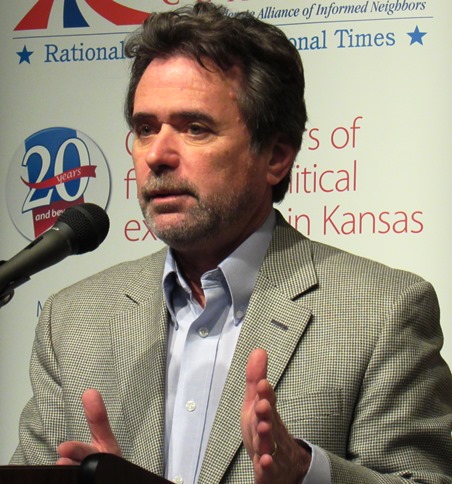by Jim McLean, Kansas News Service
Three weeks into the 2019 legislative session, the battle lines are becoming clear.
Democratic Gov. Laura Kelly is keeping a relatively low profile (for a new governor) and sticking to her plan of triaging state needs and responding to the most urgent among them.
Toward that end, she’s told her cabinet members to make a deep-dive assessment of their agencies.
On the surface, it’s clear the budget crisis that crippled the state in the last several years of former Republican Gov. Sam Brownback’s administration did real damage.
But beyond the obvious need for more social workers in the state’s troubled foster care system and more snowplow operators at the Kansas Department of Transportation, Kelly needs to know more precisely where the lack of personnel and expertise is the most consequential.
What the data reveal will dictate her priorities for the next three years.
On the legislative front, Kelly is steeling herself for an early confrontation with Republican leaders on the tax-relief bill they’re rushing to her desk.
The measure that Senate President Susan Wagle is personally shepherding through the process would reduce revenues in the budget year that starts July 1 by about $191 million a year.
That is a very rough estimate. Lawmakers really don’t know how much it would cost.
Whatever its price tag, the bill — aimed mostly at reducing the tax burden on large multinational corporations — alarms Kelly. It also concerns many lawmakers, including some who will, for political reasons, probably vote for it.
They’re concerned the bill and the recession many believe is in the offing could plunge the state back into a budget crisis like the one triggered by Brownback’s tax-cutting experiment. He promised those cuts would jolt the Kansas economy into hyperdrive. Instead, they tanked state revenues.
From a political standpoint, Wagle and the Republicans have a strong hand. They’ve got backing from the powerful Kansas Chamber and some its most influential members.
A top executive from Spirit AeroSystems — a big employer in the state’s Wichita-centered aviation industry — recently told lawmakers they need to “clearly define” how the state will account for recent changes in the federal tax code and do it quickly.
Also, because the bill would “return” money collected from state payers only because of those federal changes, GOP leaders could charge Kelly with breaking a campaign promise in the event she refuses to sign the bill. A promise not to raise taxes.
Still, based on her specific request that lawmakers refrain from making any major tax changes, most expect Kelly will veto the bill.
As one moderate Republican lawmaker put it: “This is purely a test. She needs to show some spine.”
That means Kelly shouldn’t expect moderates who will likely join Democrats in supporting her on Medicaid expansion and public school funding to have her back on this issue. Not this early in the session.
They understand that voting against tax relief would likely guarantee an immediate postcard campaign to soften the ground for well-funded conservative challengers in the 2020 Republican legislative primaries.
In her veto message, Kelly will probably say that the state might be able to afford some modest tax relief down the road. But not this much, this soon.
It’s also becoming clear that GOP leaders have no intention of dropping their long-standing opposition to Medicaid expansion. One indication of that occurred very much behind the scenes this week.
Republican leaders wanted the governor’s expansion bill introduced in the House health committee for a couple of reasons. One, they had it stacked with expansion opponents. Two, it’s a non-exempt committee, meaning bills it hasn’t worked by the mid-point of the session are effectively dead.
So to ensure that the expansion bill remains a viable bargaining chip until the end of the session, supporters introduced it in the House Appropriations Committee. Because it’s responsible for hammering out the budget, that committee is exempt from the so-called turnaround deadline.
That’s just one example of how the maneuvering on contentious issues often occurs below the surface and out of public view.
Jim McLean is the senior correspondent for the Kansas News Service, a collaboration of KCUR, Kansas Public Radio, KMUW and High Plains Public Radio covering health, education and politics. You can reach him on Twitter @jmcleanks.
Kansas News Service stories and photos may be republished at no cost with proper attribution and a link to ksnewsservice.org.
See more at https://www.kcur.org/post/jim-mclean-stories-behind-fights-brewing-kansas-legislature



